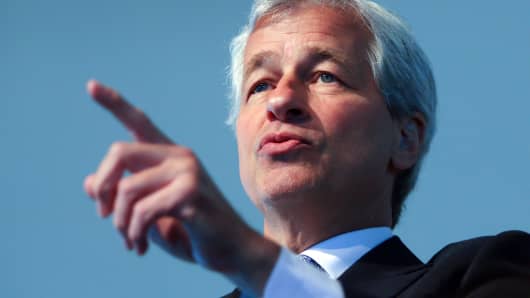Jamie Dimon made an unscripted remark in JPMorgan Chase's conference call with investors on Tuesday. He told listeners not to be surprised if, in the future, he no longer participates in these calls. This was a shocker given his interaction with investors up to this point in his career — and it raises the question as to why he would make this comment.
Mr. Dimon has been unique in his dealings with security analysts. His active interaction began when he took over as CEO of Bank One. This was a very troubled bank and it would take years to solve its multiple problems, most of which were tied up in its balance sheet but some of which were due to its operating strategies.
Read MoreDimon: Don't read too much into this, but ...
Mr. Dimon clearly believed that he was needed to explain in as detailed a fashion as was possible his plan to resuscitate the company and how he was proceeding on implementing that plan. He was honest, often indicating where he or his company had made mistakes. He was also combative pushing his listeners to think more clearly about their views concerning the company. This approach gained Mr. Dimon more credibility than any other CEO in the industry. He created a legion of true believers — including myself.
Plus, it did not hurt that he succeeded in turning Bank One around. He was so successful in this pursuit that he was able to complete a reverse merger and wind up as CEO of the much larger JPMorgan Chase. Once there, Mr. Dimon was faced with the challenge of turning this bank around. It had overexposed itself to the digital revolution in the 1990s that collapsed in the early 2000s.
Again, Mr. Dimon was front and center explaining what was needed; what he was doing; and how he was implementing his solutions. He was successful in this pursuit but the financial crisis then emerged. Now, Mr. Dimon was again required to be front and center dealing with the critical issues that required explanation. As his successes grew, his confidence grew and he became a bit more combative, drawing in even more investors, who felt safe letting Jamie Dimon handle their money.
What changed?
Three events then occurred, which may have changed his approach in dealing with investors. First, there was the "London Whale" incident, where one trade cost the firm an estimated $6.2 billion and raised questions concerning Dimon's ability to control his organization; then, a number of top executives left the company to accept leading or CEO roles at other institutions; and finally, he got sick.
Read MoreJPMorgan Chase earnings beat expectations
Others may differ with this view, but there was a definite change in Mr. Dimon's public persona after these events. He was far less vocal on conference calls. He was no longer very confrontational and he was willing to let subordinates handle most of the questions asked. Plus, when he did speak. it was more in an informational and conciliatory fashion.
Jamie Dimon no longer railed at government mistakes. He no longer baited the press. Plus, he almost never used his catch phrase to analysts – i.e., "that's your job to figure out." He was different. Then, on Tuesday, he made the key statement:
"Before you all go, I just want to tell you one of these days I'm not going to come DM on this call. … So don't be surprised if one day I don't show up."
Why?
The bank claims that this was just and "off-the-cuff" remark and that there will be no change. It is adamant that there are no health issues and that Mr. Dimon will be in as much control of the organization as he always was. I believe these statements but I do not believe that Mr. Dimon spoke without thinking about what he said.
The world has changed for Mr. Dimon. There is no great crisis to be solved. No Bank One. No financial crisis. No big government regulation. All of these events are passed — even if there may be some leftovers from each. Mr. Dimon now leads the company that has the fifth largest profits of any company in the United States. He faces a different set of challenges.
Read MoreTechnology's quest to answer the ultimate earnings call question
He is not in the position of a CEO that must explain away some set of problems; educate investors; or battle with the press and the government. He needs to take the role of industry leader and spokesperson. He needs to speak far less and with much more gravitas. He needs to demonstrate with new initiatives how he will keep this mammoth company at the forefront of what is now a totally new financial industry.
He appears to understand that he has the responsibility to lead the United States financial industry into the new era. If anyone is up to this challenge it is Jamie Dimon. He may have signaled on Tuesday that he is beginning the new trek.
Commentary by Richard X. Bove, an equity research analyst at Rafferty Capital Markets and the author of "Guardians of Prosperity: Why America Needs Big Banks" (2013).


